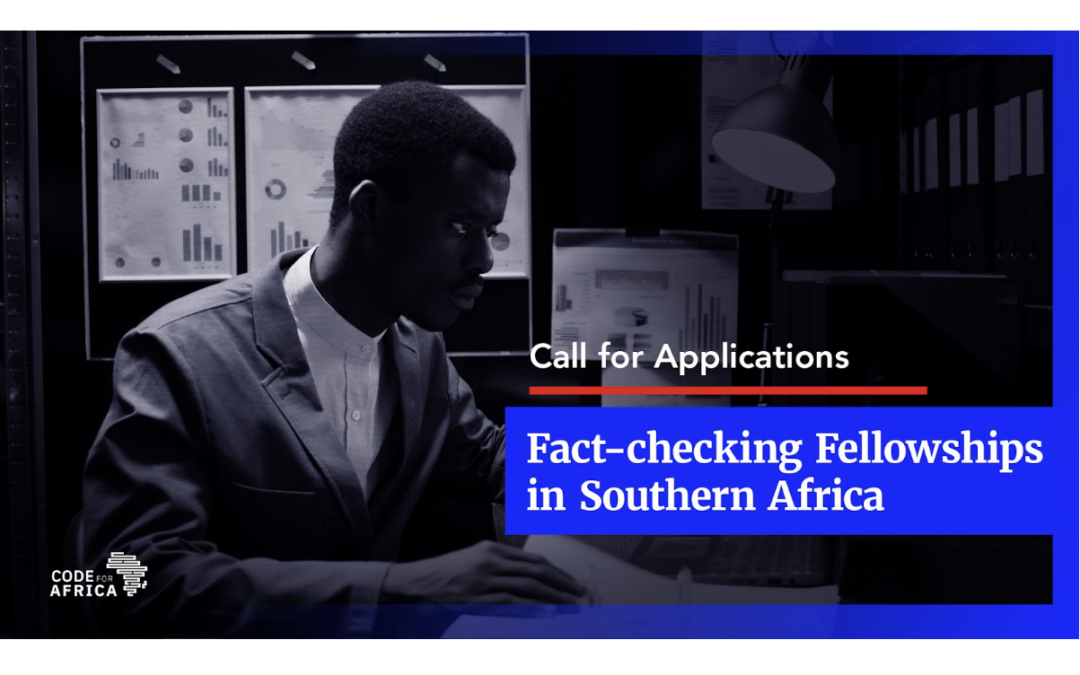Are you a journalist committed to uncovering the truth? Join our fact-checking fellowship to debunk falsehoods and strengthen information integrity in Southern Africa.
Code for Africa (CfA), through its African Fact-checking Alliance (AFCA), is offering stipend-based fellowships to journalists and fact-checkers in Southern Africa. The fellowship seeks to equip participants with the skills and tools to investigate, debunk misinformation and disinformation and strengthen information integrity in the region.
These part-time fellowships are implemented under the Detecting, Disrupting and Deplatforming Malign Actors project, funded by Norway’s Ministry of Foreign Affairs. The fellowship will support journalists and fact-checkers from the following countries: Angola, Botswana, Comoros, Democratic Republic of Congo, Eswatini, Lesotho, Madagascar, Malawi, Mauritius, Mozambique, Namibia, Seychelles, South Africa, United Republic of Tanzania, Zambia, and Zimbabwe.
The fellowship
Under this programme, CfA will award four stipend-based fellowships to innovative journalists and fact-checkers for a period of six months. The fellows will be expected to produce fact-checking articles highlighting the harmful misinformation and disinformation in Southern Africa.
Fellows will receive editorial training and mentoring from CfA’s PesaCheck, iLAB, and AFCA teams. They will also be expected to share these skills within their organisations and newsrooms.
The fellows will use their skills and preferred platforms to publish and amplify the debunks in written, visual, or audio formats. The debunks will be primarily in local languages, with emphasis on engaging the youth.
The details of the fellowship are outlined as follows:
- Duration: 6 months
- Award Amount: Each Fellow will receive a monthly stipend.
- Additional Support: Fellows will receive hands-on technical training and one-on-one mentorship from PesaCheck’s fact-checking team, iLAB investigative analysts, and CfA’s staff, including technologists, data analysts, multimedia producers, and editors. They will also receive support to enhance existing CheckDesks or launch flagship CheckDesks within their newsrooms.
- Publishing Support: Fellows will publish their projects on their media platforms and receive assistance in publishing internationally.
Candidates must meet the following criteria:
- Must not work for any paramilitary or security organisation and must be non-partisan.
- Must be established journalists or digital storytellers with at least one year of media experience and a portfolio of published work.
- Preferred experience in fact-checking.
- Must be affiliated with a media partner and publish or broadcast their work in mainstream media.
- Must be fluent in English and/or French, depending on the official language of their country.
- Must have access to a reliable computer with stable internet connectivity to participate in programme activities and online courses/mentoring.
- Must be based in one of the following countries: Angola, Botswana, Comoros, Democratic Republic of Congo, Eswatini, Lesotho, Madagascar, Malawi, Mauritius, Mozambique, Namibia, Seychelles, South Africa, United Republic of Tanzania, Zambia, and Zimbabwe.
- Must commit to publishing/disseminating work on an appropriate public platform. CfA will assist with partnerships/syndications where appropriate.
- Must commit to sharing new skills and knowledge within their organisation, by sharing projects and techniques with peers.
- Must be available for virtual meetings.
The deadline for applications is 04 March 2025.
To apply, please fill out this form.
About the Partners:
Code for Africa (CfA) is the continent’s largest network of digital democracy laboratories, with over 100 full-time data scientists, forensic researchers, technologists and digital storytellers working in support of investigative media and watchdog CSO partners in 26 African countries. CfA builds digital solutions that provide actionable information to citizens to encourage informed decisions while
amplifying voices to strengthen civic engagement for improved public governance and evidence-driven accountability. CfA will give fellows access to support from its openAFRICA data ‘liberation’ team, the commons.AFRICA open source team, the source.AFRICA evidence research team, and a string of wider communities that CfA manages, including the africanDRONE community of civic drone/mapping pioneers, the sensor.AFRICA community that uses remote sensors to monitor air/water/radiation and other environmental information, the PesaCheck fact-checking team that debunks misinformation, the iLAB forensic investigation team that tracks and exposes hate speech or other toxic content, the CivicSignal media monitoring and content analysis team, and the WanaData network of women data scientists/storytellers who liberate and amplify feminist data.
The Ministry of Foreign Affairs of Norway (Royal Ministry of Foreign Affairs) is the governmental body responsible for Norway’s foreign policy. It is structured into nine departments and oversees nearly 100 diplomatic missions worldwide, including embassies, permanent delegations, and consulates general. Among its key responsibilities is promoting human rights and democratic principles.
